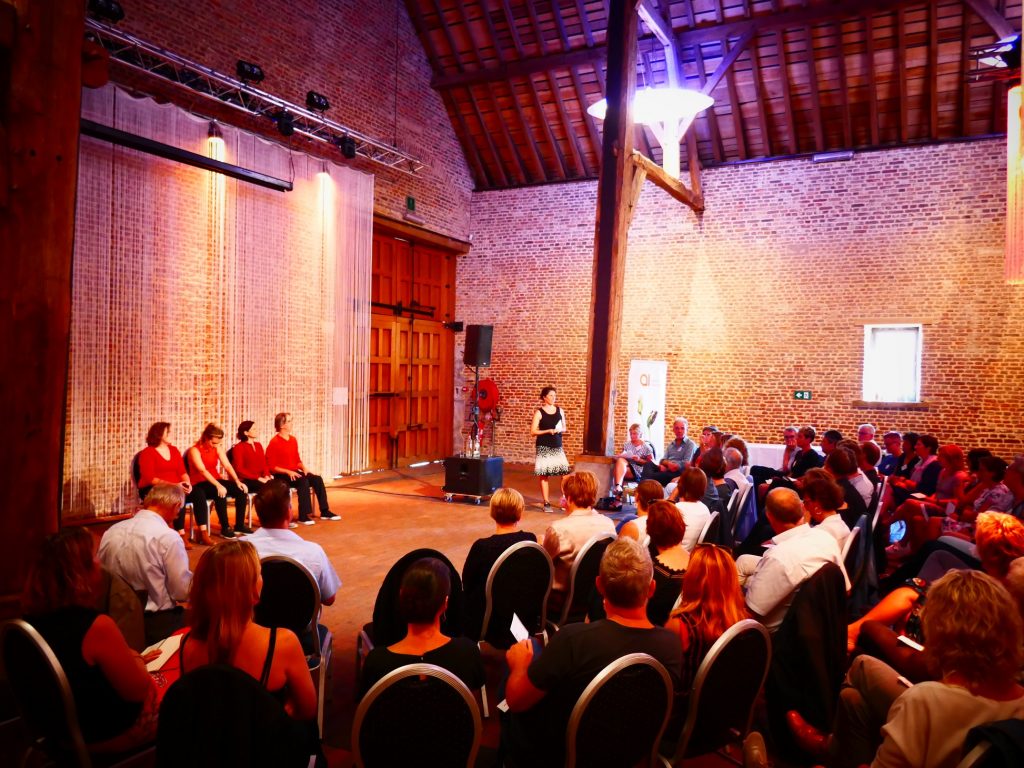On September 19 you could come and get a taste of TIM XL in Mechelen. We explained how we translate the principles of Deep Democracy to the stage and how you can use it as a group or team to look in a special mirror. Below you can read the origin story of TIM XL.
Dive into the unknown
Exactly two years ago, I came in contact with Deep Democracy fairly by accident. This is a methodology for decision-making processes in groups. As a guest lecturer at Kwadraet, I was invited to participate with their team in "level 1 of the training". Inge Van Droogenbroeck had told me that I would definitely get excited about that, given the parallels she saw with what I always talk about improvisation principles. Spurred on by her enthusiasm, I took part. I came straight from my vacation, hadn't read up on anything and already didn't quite know where I was going. I was going to be surprised. And that's what happened. The first day I was tossed back and forth between annoyance and wonder. The second day I resolutely exchanged annoyance for enthusiasm.
Triggered by a special way of guiding
That annoyance had to do with the seeming indifference of the facilitator in a Deep Democracy process, of which what transpired later was how much power and connection it created in the group in no time. It is not indifference, then, but pervasive and highly refined neutrality. Really different also from the multi-sided bias I know as a facilitator or the divided attention over each individual as a trainer.
Parallels between Deep Democracy and improvisational theater
What Inge meant quickly became clear to me. What we let people experience as improvisational principles in our training sessions with Inspinazie on communication and leadership also came up quickly here:
- openness to "the other idea"
- strengthening the smaller voice
- putting figuratively and literally "in motion"
- making the invisible visible, or diving below the waterline
Two years and one performance later
I myself took a pretty deep dive into this world, meanwhile completing the four modules of the training. I also saw in Deep Democracy a clear track in the quest that colleague Leen and I had started at that time in designing a performance where it is not the boss or the HR employee who decides what we come to play about with thematic improvisational theater. Because we often find that a different theme turns out to be more urgent than what is preconceived, we were looking for a form where the theme reveals itself as we play. So that organizations wishing to do so can engage improvisational theater in which everything comes from within the group. With a working group of Inspinazies players, we spent several months building what we now call the TIM XL into the world. We took playback theater workshops with Sarah Avci, translated Deep Democracy working forms into improvisational theater forms, did a rollout in three organizations and carefully honed the concept.
Also, in the meantime, we once plowed through an intense DD conversation ourselves as a group, under Fanny's guidance (more on that later).
Book presentation and demonstration TIM XL
On Sept. 19, TIM XL was presented in a demo version to an open audience. Indeed, Fanny Matheusen, her publisher and Inspinazie joined forces to shape the evening of her book presentation together. In addition to our own demo, I also had the honor of sitting on a panel with her, Anouk Moors of Mediv, and Yasmien Naciri, led by Tamara Lenaerts of She & Company.
It became one of those evenings where many beautiful punishing things come together, wonderful afterglow that is!
By the way, the day after, TIM XL premiered during the Appreciative Inquiry Learning Festival in Hasselt. Through our performance, the alumni of De Werf investigated the potential of their network. Contact us if you also like to use improvisational theater as self-examination for your team or organization
About the book
From scapegoat to zebratells the story of deep democracy, a method with roots in the African continent in which the minority voice is listened to. The scapegoat, who is otherwise dismissed as the weirdo, the one who is antagonistic or troublesome, becomes a source of wisdom through this method.
After all, each of us is a zebra, with our own unique stripes and personal input into every debate. So the challenge is to unify that multitude of voices without getting bogged down in bland compromises or corporate mediation attempts. With a set of simple tools and a rich philosophical underpinning, it helps From scapegoat to zebra the reader on the way to getting started with deep democracy. You will learn how to apply the method in your role as a team leader, CEO, parent, coach, process facilitator, teacher, youth worker or activist.

